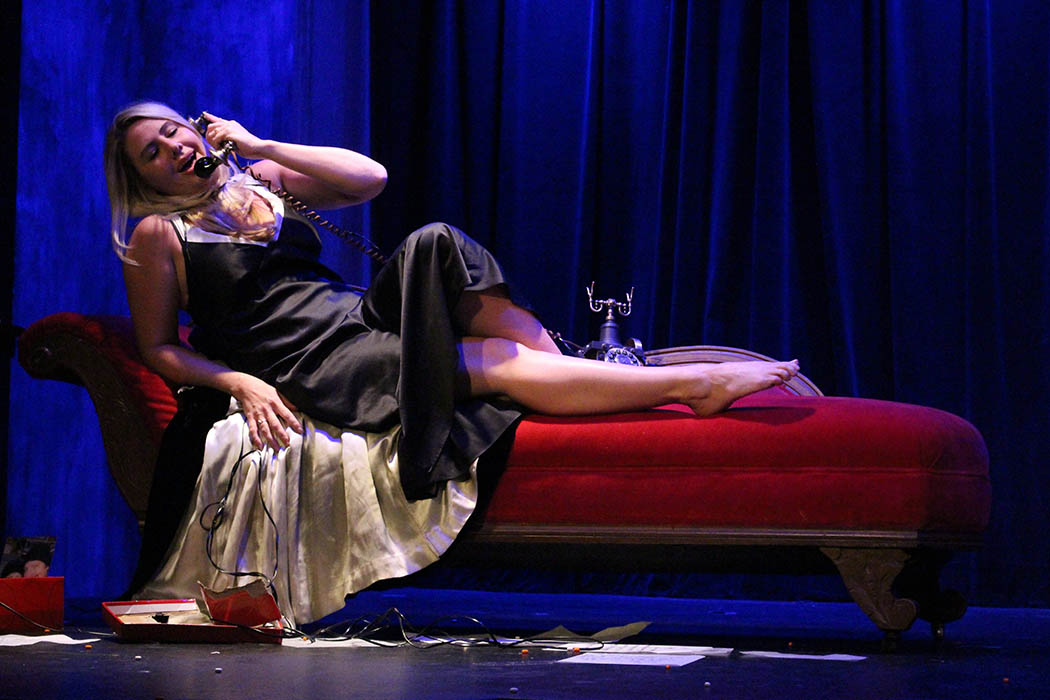Human communication via the telephone—both the attempt and the psychological result—was the broad premise of Marble City Opera’s compelling productions this weekend at the Square Room via two one act operas, The Telephone by Gian Carlo Menotti and The Human Voice by Francis Poulenc. While the physical forms of the telephone and the degree to which we allow a technological tool to affect our behavior have changed over the years, the two works left no doubt that the true issues of communication flow out of our own human conceits and frailties.
In both works, the idea of connections in human communication received a visual metaphor in the form of the corded telephone from stage director Ken Smith. In Menotti’s The Telephone, that metaphor takes on a comedic presence and mood with mildly sexual overtones. The character of Lucy (Julia Metry), facing the conflict between entertaining her boyfriend and talking on the phone, willingly wraps herself in the Princess phone’s lengthy cord, giving in to the addiction of telephone conversation over human interaction. Her boyfriend, Ben (Peter Johnson), who is desperately trying to propose marriage to her, finds himself thwarted, tangled, and frustrated by the cord. Ben eventually succeeds in proposing by calling Lucy from a pay phone at the train station as he leaves on a trip. While Menotti’s vocal score up to this point has been a musical conversation between two distinct individuals, the pair at last have a lyrical duet in which Lucy makes sure Ben will remember her telephone number.

The Telephone, first performed in 1947 on a double bill with another Menotti opera The Medium, is a light-hearted romp that overtly sidesteps any thoughts on the otherwise seriousness of thwarted personal communication. As singers and actors, both soprano Metry and bass-baritone Johnson have remarkable vocal clarity and flexibility, assets that allowed the physicality of comedy, and the naïveté of the romance, to carry the work along.
With Poulenc’s The Human Voice, the evening departed the realm of comedy and entered territory inhabited by the tragedy of dependency and lost love. The 1958 work was based on a play (La voix humaine) by the French playwright, filmmaker, and visual artist, Jean Cocteau. The Human Voice is a monologue piece in which one character (“Elle”), in one room, has a final telephone conversation with a former lover.
Just as she he had done with a previous one-character opera for MCO, Amelia Lost, soprano Kathryn Frady drew the audience deeply in as voyeurs into her psychological dilemma in The Human Voice. Frady’s brilliance as a soprano capable of riveting the audience’s attention—in vocal depth, in lyrical beauty, and in a marvelously conceived ebb and flow of posture and attitude—was as rewarding as it gets in theatre.
Ironically, The Human Voice, a work specifically and deliberately reduced to its simplest physical forms, needed a bit more in terms of minimal scenic suggestion than MCO was prepared for. While Frady carefully painted Elle’s rising and falling demeanor in subtle tints and outbursts of vividness, the symbolism of some additional background visual angle or texture supporting the singer’s poses would have underlined the specific concept that each pose was intended to convey.
In many ways, pianist and musical director Brandon Coffer became an active character in both pieces as well, providing exquisite timing and pacing where required. In the case of the Poulenc, that character is essential in that the piano is tasked with being the motivating sound of the telephone ringing. While the score acts as background for Elle’s drama, Poulenc’s basic musical scheme of chord sequences seemed to cry out for the instrumental textures available to a reduced-sized orchestra as written, rather than the tonal limitations of a single piano.
In the several years of Marble City Opera’s existence, the Knoxville audience has come to depend on, if not take for granted, the organization for performance of an entire segment of works that would otherwise go unperformed. Having recently witnessed what happens when a community asset is taken for granted, we owe it to MCO, and ourselves, to continue to show support.
Marble City Opera’s production of The Telephone by Gian Carlo Menotti and The Human Voice by Francis Poulenc has a final performance this evening at 8:00 PM at the Square Room off Market Square.





